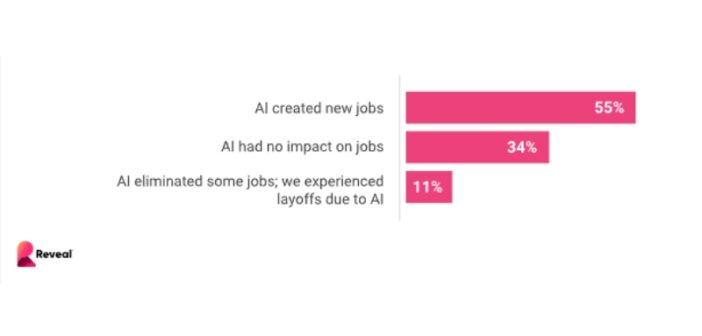According to part two of the 2025 Reveal Software Development Challenges Survey by Infragistics, expanding AI use is now the top priority for tech leaders, with 73% naming it their main focus. The survey of 250 leaders also found strong momentum—75% used AI in software development in 2024, and half of the remaining organizations plan to adopt it in 2025.
The main driver of AI adoption is task automation to boost productivity, more than half the 2025 Reveal survey respondents (55%) said. Other notable ways companies are using AI in software creation include:
- Optimizing code (48%)
- Improving diagnostics (46%)
- Testing software (46%)
- Fixing coding errors (43%)
- Eliminating repetitive or administrative tasks (43%)
- Creating personalized experiences for customers (41%)
- Reducing development time/improving productivity
- Addressing limited resources (28%)
AI Integration Safeguards
The momentum behind AI integration shows no signs of slowing, the Reveal data shows. Yet, serious concerns continue to surface. More than a third (37%) of respondents flagged the risk of errors, bugs, and inefficiencies in AI-generated code—issues that could compromise reliability and performance. Equally troubling, another 37% highlighted the potential for security vulnerabilities, underscoring the urgent need for robust safeguards as AI becomes more deeply embedded in critical systems.
“AI is accelerating innovation across the software development lifecycle, streamlining tasks from code generation to testing and deployment,” explained Casey Ciniello, Reveal and Slingshot Senior Product Manager, Infragistics. “However, integrating AI into development workflows introduces critical considerations—particularly around accuracy, data integrity, security vulnerabilities, and compliance. Organizations must implement governance frameworks and technical safeguards to ensure safe, strategic implementation.”
The tech industry is acutely aware of the complex challenges posed by AI. According to the Reveal survey, data privacy emerges as the most pressing concern, with 78% of respondents citing it as their top issue. Transparency (57%) and data safety (55%) closely follow, reflecting widespread unease about how AI systems are developed and deployed. In response, companies are taking action: over 60% are implementing ethical AI guidelines, 59% are implementing formal privacy policies to protect against misuse, and 54% are introducing protections for sensitive information.
Ethical Considerations: Navigating AI Bias, Privacy Violations, and Untested Tech
As AI becomes more deeply embedded in software development, the ethical stakes continue to rise. The survey reveals that privacy violations (38%), bias in AI models (37%), and the deployment of AI applications that have not been securely tested (36%) are among the most pressing concerns for organizations in 2025. These risks not only threaten user trust but also expose companies to legal and reputational fallout. As AI and software development continue to converge, organizations must take a proactive approach to governance and risk mitigation.
According to a 2025 article in the Vatican News, “AI ‘could introduce important innovations but it also risks aggravating situations of discrimination, poverty, “digital divide,” and social inequalities.”
The message is clear: AI innovation must be guided by strong ethical principles, rigorous testing, and comprehensive governance frameworks. Without them, the promise of AI could become a liability.
AI Fuels Job Creation—Not Cuts
Contrary to fears that AI would result in mass layoffs, the data tells a different story. Among companies that have adopted AI, 55% reported new job creation, with 63% of those adding up to 25 new positions. AI isn’t replacing talent—it’s reshaping roles and creating new opportunities in a rapidly evolving tech environment. This shift underscores a growing consensus: successful AI integration is about empowering teams, not replacing talent.
“Businesses increasingly understand that ignoring AI is no longer an option,” said Ciniello. “The conversation has shifted—from whether to adopt AI to how to implement it responsibly and strategically. The real challenge now lies in ensuring AI enhances value without compromising safety and trust..”
Read the 2025 Reveal survey report here.
Related News:
Reveal Survey Report Unveiled 2025 Top Software Development Challenges
New Research Reveals 400K Talent Gap by 2035 in the Future of Insurance
Survey Methodology
A total of 250 technology leaders participated in Reveal’s sixth annual survey from December 2024 to January 2025. Infragistics research has been providing a comprehensive analysis of current trends and challenges in software development, business intelligence, and AI adoption, while identifying opportunities for businesses to optimize operations, address emerging risks, and navigate the evolving technological landscape since 2019.

